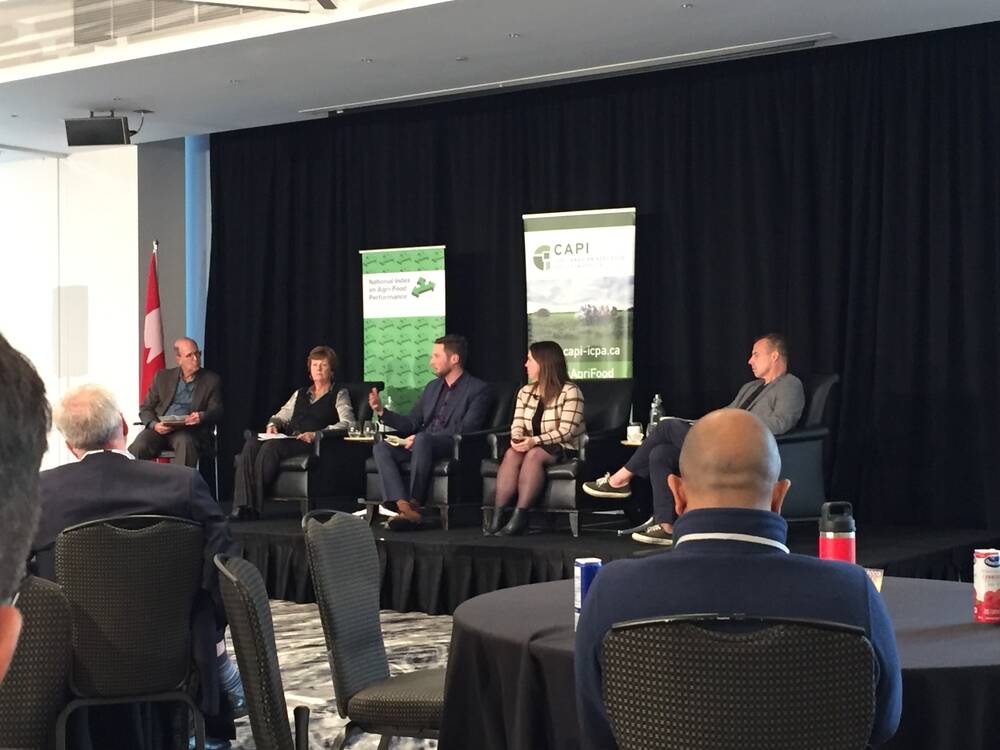Diagnosing the sustainability of Canadian agriculture

When it comes to sustainability in agriculture, Canada may be healthier than it realizes.
Read Also


New soybean disease on the rise in United States
Red crown rot, a relatively recent soybean disease, is gaining traction in the United States, mostly in Indiana, with confirmed cases in Illinois and Missouri.
Experts from across the agriculture industry discussed the state of sustainability at the recent Canadian Agri-Food Policy Institute annual conference. They set the tone at the Oct. 2 kickoff by “diagnosing” Canadian agriculture sustainability issues.
Though the sickness is real, they said there is hope.
Why it matters: Canadian agriculture has made significant productivity and efficiency gains, but defining sustainability still poses challenges.
“They’re trying all sorts of different medications thinking that the problem might be slightly different,” said Justine Hendricks, CEO of Farm Credit Canada. “Yet they’re coming back to the same point where they started from.”
Lloyd Day, deputy director general of the Inter-American Institute for Cooperation on Agriculture, said he saw many “viruses,” in agriculture across the Americas, but productivity and growth are healthy.
“Productivity is better than it’s ever been,” he said. “Emissions from agriculture are going down in the world, particularly here in North America.”
In a subsequent panel, guests built on Day’s comments about global progress by offering perspectives from international markets.
Katie McRobert, executive director of the Australian Farm Institute, said smaller regional markets that import Australian agricultural goods could bear the brunt of mismanaged sustainability legislation in Australia, which exports a significant amount of food.
Mark Titterington, co-founder and director of the Forum for the Future of Agriculture, expressed cost-related concerns.
“The challenge when it comes to sustainability is just who is going to pay for it, and it can’t all be on the shoulders of the farmer,” he said.
Panelists also provided key takeaways for Canadians.
McRobert said Canada should focus on conversations with compromises about how to decarbonize food production for a growing population, which she said is not common in Australia.
Carlos Salinas, U.S. Soybean Export Council regional director, said goal setting should remain practical. He said he sees many governments in South America set goals with good intentions, but with little practicality for farmers.
Building on the theme of outside advice, Derek Nighbour, CEO of the Forest Product Association of Canada and Tim Kennedy, CEO of the Canadian Aquaculture Industry Alliance, offered sustainability perspectives from other Canadian sectors.
Nighbour highlighted the importance of communication on sustainability across sectors.
“For all the informational tools we have out there, there’s never been more confusion and misinformation,” he said. “It is really, for us, very much a back-to-basics approach, sustained communication and picking your moments to push back there.”
Nighbour said work with public servants, particularly those at Environment and Climate Change Canada, is critical in his sector and in agriculture.
Mike Wilson, executive director of the Smart Prosperity Institute, said governments should act as partners in building sustainable agriculture, not as central planners.
Scott Ross, executive director of the Canadian Federation of Agriculture, said governments must think about the producer audience they’re speaking to and understand their challenges. He said telling farmers to “’go off and figure that out” hampers progress.
Alanna Koch, chair of the Global Institute for Food Security, said she hoped to see a united front made up of diverse voices from the agriculture industry approach a new government to improve the experience. As a farmer, she often felt uneasy when asked to supply data.
Regulating sustainability can be a challenge, however. Brent Preston, president of Farmers for Climate Solutions and a Creemore, Ontario area vegetable producer, said attempting regulation is often an unpopular endeavour.
“We’re going to be regulated,” he said. “This is where public policy comes in when we have a complex problem that affects the whole range of producers across the country.”
Preston said the best way to create sustainability protocols is to look for areas of multiple benefits across economic, environmental and social sustainability. He emphasized the importance of engaging farmers.
“I’m frequently the only producer in a room talking about agricultural policy,” he noted.
Pierre Petelle, CEO of CropLife Canada, said an important piece of effective policy creation is “getting grassroots growers at the table early” and “making sure that the entirety of agriculture is represented.”
Nick Betts, managing director of the Canadian Alliance for Net-Zero Agri-food, said sustainability should be seen as Canada’s primary strategic advantage and it must be built on other competitive factors like efficiency and productivity. However, Ben Gibbons, founder of the Waterpoint Lane agriculture-focused venture capital fund, said it should “absolutely not” be Canada’s number one competitive advantage, as it is an outcome of efficiency in agriculture.
Jean-Michel Couture, president of the consulting firm Groupe AGÉCO, said sustainability is a byproduct of other advantageous factors, not an advantage in itself.
“Sustainability is what comes out of great execution. Farmers execute sustainability on a daily basis.”
MNP’s Stuart Pearson said the focus should be on Canada’s ability to feed Canadians and feed the world rather than on sustainability.
Across all panels and discussions, speakers expressed the need for meaningful change. In the day’s final panel, ALUS CEO Bryan Gilvesey said change in agriculture is ubiquitous.
Sylvie Cloutier, CEO of Quebec-based food processing group CTAQ, echoed that view.
“Everybody knows we need to initiate change. We are all living the same situation. Change is happening, but many are struggling … they know that down the road it’s an opportunity, but right now it’s a challenge.”
She said these challenges will likely remain as long as consumers have to pay higher prices for sustainable goods.
Source: Farmtario.com

